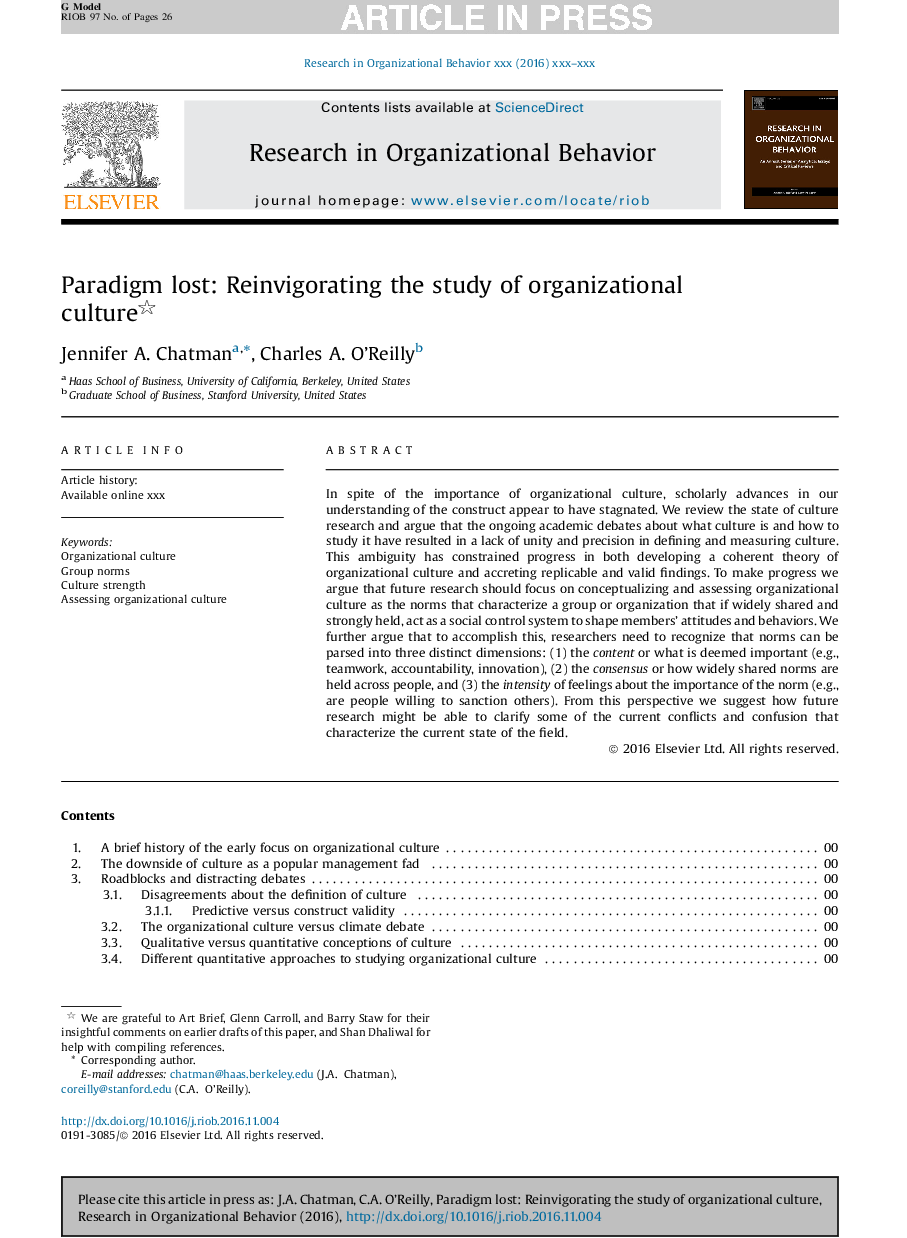| کد مقاله | کد نشریه | سال انتشار | مقاله انگلیسی | نسخه تمام متن |
|---|---|---|---|---|
| 7254260 | 1472196 | 2016 | 26 صفحه PDF | دانلود رایگان |
عنوان انگلیسی مقاله ISI
Paradigm lost: Reinvigorating the study of organizational culture
ترجمه فارسی عنوان
پارادایم از دست رفته است: ترویج مطالعه فرهنگ سازمانی
دانلود مقاله + سفارش ترجمه
دانلود مقاله ISI انگلیسی
رایگان برای ایرانیان
کلمات کلیدی
فرهنگ سازمانی، هنجارهای گروه، قدرت فرهنگ، ارزیابی فرهنگ سازمانی،
ترجمه چکیده
علیرغم اهمیت فرهنگ سازمانی، پیشرفت های علمی در درک ما از ساختار به نظر می رسد که رکود داشته باشد. ما تحقیقات فرهنگی را مرور میکنیم و استدلال می کنیم که بحث های دانشگاهی در مورد فرهنگ و نحوه مطالعه آن منجر به عدم وحدت و دقت در تعریف و اندازه گیری فرهنگ شده است. این ابهام در پیشرفت تدوین نظریه منسجم فرهنگ سازمانی و به دست آوردن یافته های قابل تکرار و معتبر محدود شده است. برای دستیابی به پیشرفت ما استدلال می کنیم که تحقیقات آینده باید به مفهوم سازی و ارزیابی فرهنگ سازمانی به عنوان هنجاری هایی که گروه یا سازمان را مشخص می کنند، که اگر به طور گسترده ای مورد استفاده قرار گیرد و به شدت برگزار شوند، به عنوان یک سیستم کنترل اجتماعی برای شکل دادن رفتار و رفتار اعضا عمل می کنند. ما بیشتر استدلال می کنیم که برای رسیدن به این هدف، محققان باید تشخیص دهند که هنجارها را می توان به سه بعد مشخص تقسیم کرد: (1) محتوای یا آنچه مهم است (مثلا کار گروهی، پاسخگویی، نوآوری)، (2) هنجارهای مشترک در سراسر مردم برگزار می شود و (3) شدت احساسات در مورد اهمیت هنجار (به عنوان مثال، افرادی که مایل به مجازات دیگران هستند). از این دیدگاه، ما پیشنهاد می کنیم که چگونه تحقیقات آینده می تواند برخی از درگیری های کنونی و سردرگمی را که وضعیت فعلی این میدان را مشخص می کند، روشن کند.
موضوعات مرتبط
علوم انسانی و اجتماعی
مدیریت، کسب و کار و حسابداری
بازاریابی و مدیریت بازار
چکیده انگلیسی
In spite of the importance of organizational culture, scholarly advances in our understanding of the construct appear to have stagnated. We review the state of culture research and argue that the ongoing academic debates about what culture is and how to study it have resulted in a lack of unity and precision in defining and measuring culture. This ambiguity has constrained progress in both developing a coherent theory of organizational culture and accreting replicable and valid findings. To make progress we argue that future research should focus on conceptualizing and assessing organizational culture as the norms that characterize a group or organization that if widely shared and strongly held, act as a social control system to shape members' attitudes and behaviors. We further argue that to accomplish this, researchers need to recognize that norms can be parsed into three distinct dimensions: (1) the content or what is deemed important (e.g., teamwork, accountability, innovation), (2) the consensus or how widely shared norms are held across people, and (3) the intensity of feelings about the importance of the norm (e.g., are people willing to sanction others). From this perspective we suggest how future research might be able to clarify some of the current conflicts and confusion that characterize the current state of the field.
ناشر
Database: Elsevier - ScienceDirect (ساینس دایرکت)
Journal: Research in Organizational Behavior - Volume 36, 2016, Pages 199-224
Journal: Research in Organizational Behavior - Volume 36, 2016, Pages 199-224
نویسندگان
Jennifer A. Chatman, Charles A. O'Reilly,
